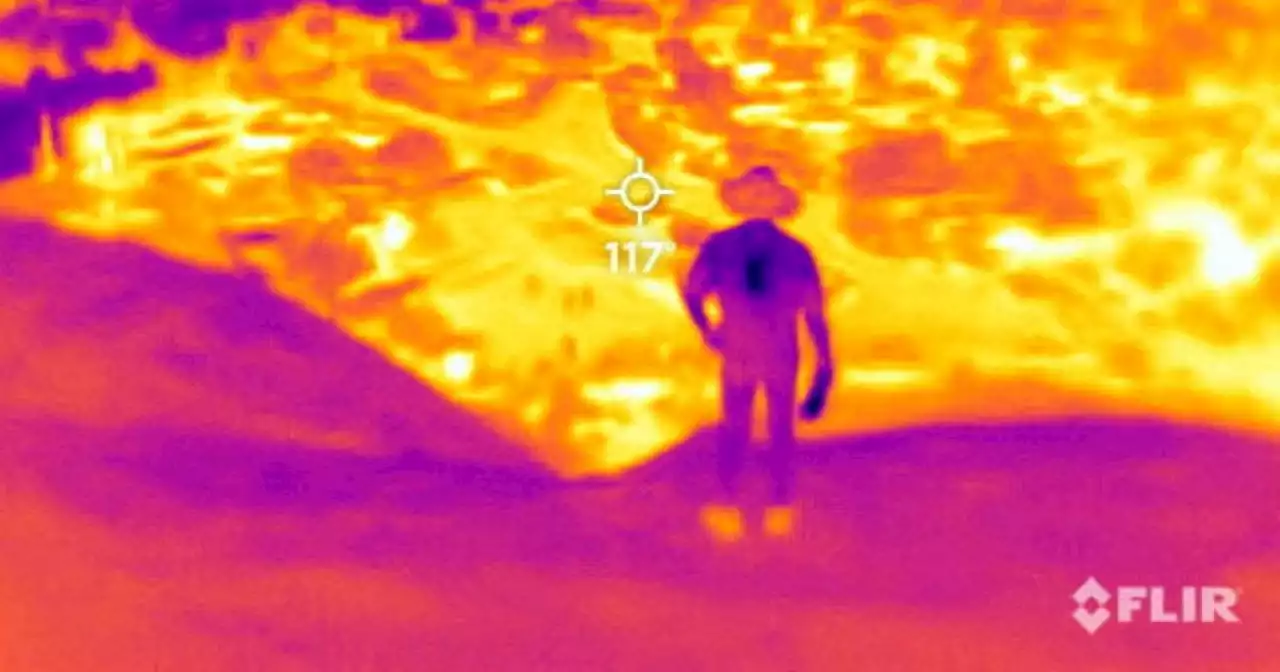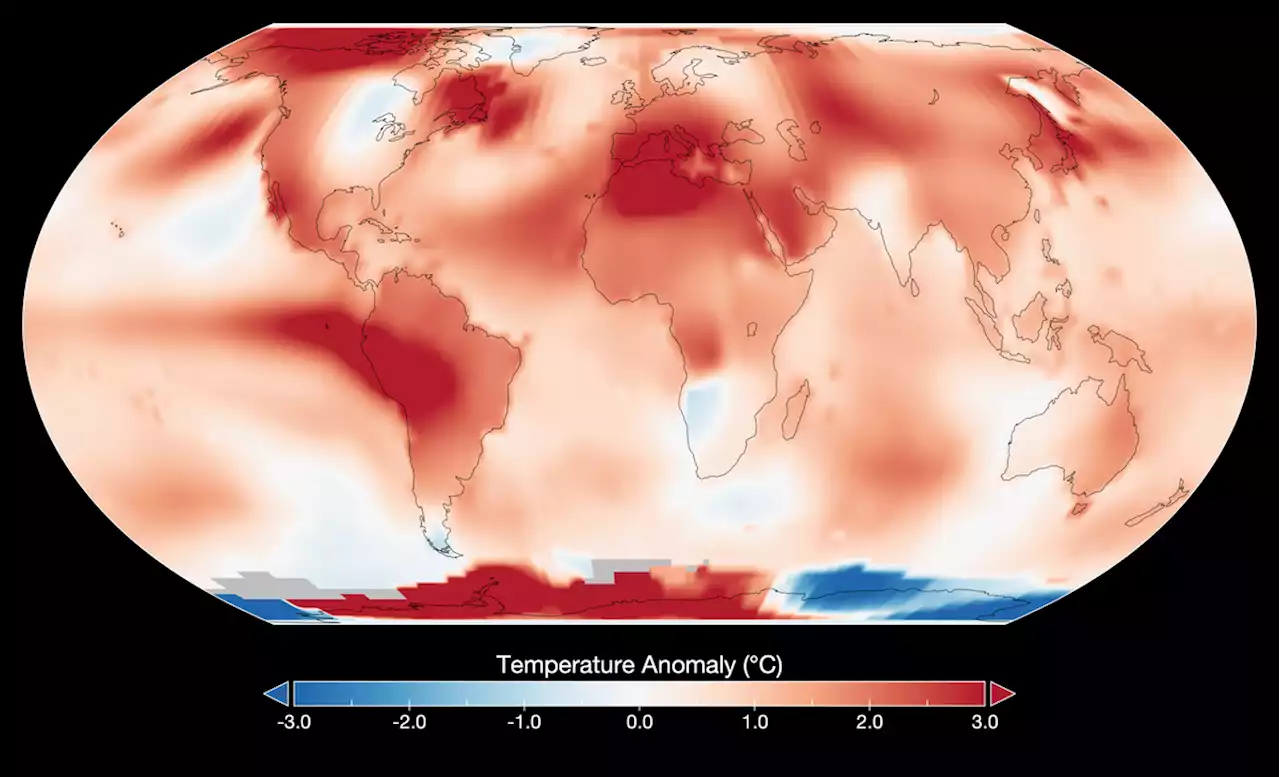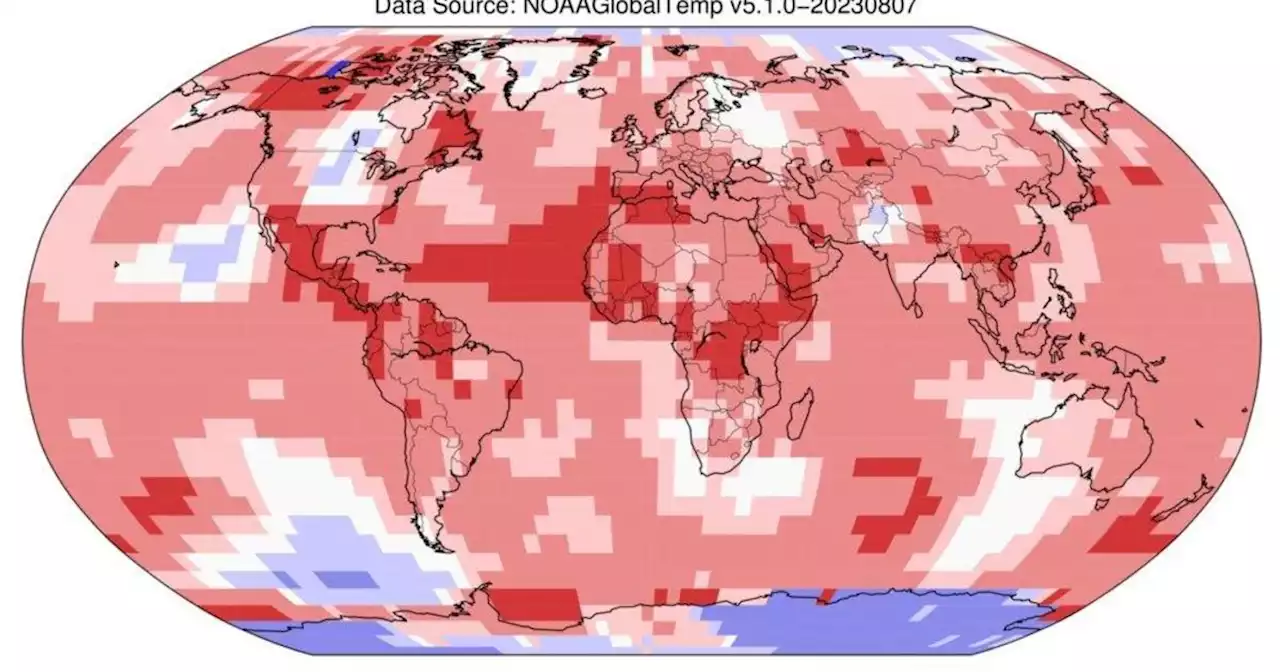On Monday, officials at NASA and the National Oceanic and Atmospheric Administration unveiled new data indicating that July was the hottest month on record, with both global sea-surface and land temperatures soaring well above longstanding averages.
Globally, the surface temperature on Earth in July was 2.02 degrees Fahrenheit greater than the 20th century's average temperature, which was 60.4 degrees Fahrenheit, data shows. It marked the first July in recorded history where the temperature exceeded 1.8 degrees above the long-term average, according to NOAA, which noted that the latest temperature record was also 0.36 degrees warmer than the previous July record, set in 2021.
"July 2023 marked the 47th-consecutive July and the 533rd-consecutive month with temperatures at least nominally above the 20th-century average," the agency said. This past July also marked the fourth consecutive month where global ocean surface temperatures reached a new record high, owing in part to the onset of El Niño, a recurring climate pattern determined by sea surface temperatures and precipitation levels across the equatorial Pacific. NOAA announced the arrival of El Niño, the"warm phase" of the climate cycle that replaces its counterpart, La Niña, in June.
According to data collected by NASA, the five hottest Julys since the agency started tracking temperatures in 1880 have happened in the last five years. This year's record-breaking heat hit certain parts of the globe harder than others, with portions of South America, North Africa, North America and the Arctic Peninsula experiencing especially blistering weather. In those places, July temperatures in 2023 stood at about 7.
"NASA data confirms what billions around the world literally felt: temperatures in July 2023 made it the hottest month on record. In every corner of the country, Americans are right now experiencing firsthand the effects of the climate crisis, underscoring the urgency of President Biden's historic climate agenda," NASA Administrator Bill Nelson said in a statement."The science is clear. We must act now to protect our communities and planet; it's the only one we have.
United States Latest News, United States Headlines
Similar News:You can also read news stories similar to this one that we have collected from other news sources.
 Earth just had its hottest July 'by a long shot,' NASA and NOAA sayThe planet had its warmest July on record 'by a long shot,' according to NASA and NOAA. The new milestone is just the latest in a series of worrying climate extremes in recent months, including record-warmth across the world’s oceans.
Earth just had its hottest July 'by a long shot,' NASA and NOAA sayThe planet had its warmest July on record 'by a long shot,' according to NASA and NOAA. The new milestone is just the latest in a series of worrying climate extremes in recent months, including record-warmth across the world’s oceans.
Read more »
 3 snowy owlets hatch at Akron ZooAdorable! The owlets, hatched in early July, are being cared for by their parents, Frost and Cirrus, and are doing well, the zoo said last week.
3 snowy owlets hatch at Akron ZooAdorable! The owlets, hatched in early July, are being cared for by their parents, Frost and Cirrus, and are doing well, the zoo said last week.
Read more »
 July was Earth's hottest month ever recorded, EU climate service says, warning of 'dire consequences'Smashing these records has 'dire consequences for both people and the planet,' warned the head of the EU's Copernicus weather service.
July was Earth's hottest month ever recorded, EU climate service says, warning of 'dire consequences'Smashing these records has 'dire consequences for both people and the planet,' warned the head of the EU's Copernicus weather service.
Read more »
 National Gallery Nights Return Next MonthNational Gallery Nights return this fall on the second Thursday of each month, starting on September 14!
National Gallery Nights Return Next MonthNational Gallery Nights return this fall on the second Thursday of each month, starting on September 14!
Read more »
 July 2023 was the hottest month on Earth since at least 1880 'by a longshot,' NASA saysMonisha Ravisetti is Space.com's Astronomy Editor. She covers black holes, star explosions, gravitational waves, exoplanet discoveries and other enigmas hidden across the fabric of space and time. Previously, she was a science writer at CNET, and before that, reported for The Academic Times. Prior to becoming a writer, she was an immunology researcher at Weill Cornell Medical Center in New York. She graduated from New York University in 2018 with a B.A. in philosophy, physics and chemistry. She spends too much time playing online chess. Her favorite planet is Earth.
July 2023 was the hottest month on Earth since at least 1880 'by a longshot,' NASA saysMonisha Ravisetti is Space.com's Astronomy Editor. She covers black holes, star explosions, gravitational waves, exoplanet discoveries and other enigmas hidden across the fabric of space and time. Previously, she was a science writer at CNET, and before that, reported for The Academic Times. Prior to becoming a writer, she was an immunology researcher at Weill Cornell Medical Center in New York. She graduated from New York University in 2018 with a B.A. in philosophy, physics and chemistry. She spends too much time playing online chess. Her favorite planet is Earth.
Read more »
